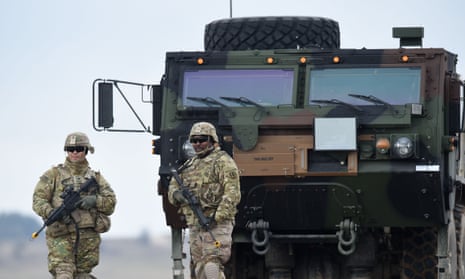Two German-Russian nationals have been arrested in southern Germany on suspicion of plotting sabotage attacks, including on US military facilities, in what officials called a serious effort to undermine military support for Ukraine.
The men, named as Dieter S and Alexander J, are suspected of operating as Russian spies on behalf of the Kremlin, according to German media sources. Prosecutors said only that the men were accused of working for a foreign secret service.
Separately, Polish and Ukrainian prosecutors said on Thursday that a Polish man had been arrested on allegations of spying for Russia in an alleged plot to assassinate Ukraine’s president, Volodymyr Zelenskiy.
The man, identified only as Pawel K, was accused of supplying information to Russian military intelligence about the Rzeszow-Jasionka airport in south-eastern Poland, which is the gateway for international military and humanitarian supplies for Ukraine. Zelenskiy frequently passes through the airport on his trips abroad.
The German prosecutor’s office said the suspects were arrested on Wednesday in the small city of Bayreuth, home to the annual Richard Wagner opera festival. It added that their homes and workplaces were being searched.
According to the statement by prosecutors, the accused were under “strong suspicion” of “having worked for a foreign secret service in a particularly serious incident”.
In addition, Dieter S, 39, was charged with “conspiring to cause an explosive attack and arson, acting as an agent for sabotage purposes and security-endangering collection of intelligence on military installations”.
Dieter S had allegedly been in contact with a member of the Russian secret services and had been developing sabotage plans in Germany since October 2023.
Germany’s foreign minister, Annalena Baerbock, said: “The suspicion that [Vladimir] Putin is recruiting agents from us to carry out attacks on German soil is extremely serious. We will not allow Putin to bring his terror to Germany.”
Baerbock has summoned Russia’s ambassador to Berlin, Sergei Nechayev, for an explanation, a move that happened with unusual haste, suggesting authorities had unequivocal proof of the link between the plot and the Kremlin.
The Kremlin said it knew nothing about the circumstances surrounding the men’s arrests.
According to prosecutors, Dieter S declared his readiness to carry out explosive and arson attacks on military infrastructure and industrial sites, with the explicit intention “to undermine the military support provided by Germany to Ukraine against the Russian war of aggression”.
He focused his attention on German and US military sites, according to the evidence gathered by investigators, which included videos and photographs.
According to Der Spiegel, the US military site Grafenwöhr, in Bavaria, southern Germany, was his main focal point. This is one of the main sites where the US military has been training Ukrainian troops, in particular in the operation of Abrams tanks.
The prosecutors said that based on “underlying facts”, there was a strong suspicion Dieter S had fought in eastern Ukraine between December 2014 and September 2016 for an armed unit of the self-proclaimed republic in Donetsk and had acquired a firearm for this purpose.
The prosecutors described the unit as a pro-Russian association that, “from spring 2014, claimed control over the Ukrainian administrative district of Donetsk with the aim of secession from Ukraine and engaged in intensive clashes with the Ukrainian armed forces. The association repeatedly used violence against the civilian population.”
Alexander J, 37, is suspected of supporting Dieter S from March 2024 at the latest. He is also accused of espionage on behalf of a foreign service.
Dieter S was brought before judges at Germany’s federal court of justice in Karlsruhe on Wednesday and remanded in custody. Alexander J was brought before judges on Thursday, prosecutors confirmed.
Reacting to news of the foiled attacks, Germany’s interior minister, Nancy Faeser, said: “Our security authorities have prevented potential explosive attacks intended to strike at and undermine our military help for Ukraine.”
Faeser said Germany would not be cowed by the attacks. “We will continue to hugely support Ukraine and will not let ourselves be intimidated,” she said.
The justice minister, Marco Buschmann, called the arrests an “investigative success in the fight against Putin’s sabotage and espionage network”.
“We know that the Russian power apparatus also has our country in its sights. We must react to this threat defensively and determinedly,” he said, without naming specific measures.
Putin’s spokesperson, Dmitry Peskov, told reporters on Thursday that the Kremlin did not possess any information regarding the arrests.
There have been several Russian spy incidents in Germany in recent years, including a former security guard working at the British embassy in Berlin who was paid by the Russian state to spy on its behalf.
A growing number of hacking attacks, in particular of the Bundestag, have been attributed to Russia-affiliated agents.
Last month a conference call between a group of Germany’s top military generals was intercepted by Russia, with its leak via Kremlin-backed TV causing widespread embarrassment and concern in Berlin and prompting a tightening of security regulations.
Diplomatic relations between Berlin and Moscow have been hugely scaled back since February 2022, with many Russian diplomats forced to leave the country.
Germany is home to a large Russian-speaking diaspora, many of them holding dual citizenship. In particular since Russia’s full-scale of invasion of Ukraine, thousands of Russians have been granted asylum in Germany, many of them having wanted to escape military service.
In recent months there has been an increasingly vocal debate about whether this inflow of Russian citizens might pose a security threat for Germany, as one of the largest donors of military support to Ukraine, as well as one of the countries to have taken in a considerable number of Ukrainian refugees.
According to German practice, suspected criminals are identified using only the initial letter of their surnames.









